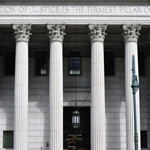New York Court of Appeals Shows No Love to Plaintiff’s in Personal Injury Cases this Valentine’s Day

In the case of Auqui v. Seven Thirty One Limited Partnership , the New York Court of Appeals ruled on Thursday, February 14, 2013 that a plaintiff in a personal injury suit cannot litigate an issue in their case, if that issue has already been ruled on in a related worker’s compensation proceeding. Since issue preclusion, a.k.a. “collateral estoppel,” usually prevents litigation in proceedings involving claims stemming from the same incident, the decision should not be too surprising. However, like most cases that have been heard by the higher courts, there is more to this story.
The facts of the case date back to 2003, when Jose Verdugo was injured at a construction site. Mr. Verdugo was making a delivery for his employer to the site when a piece of plywood fell on him, injuring his head, neck and back. He also suffered from depression and post-traumatic stress following the incident. It was determined by a worker’s compensation administrative judge that Mr. Verdugo was indeed injured and entitled to benefits, which he received from 2003 to 2006.
In 2004, Mr. Verdugo’s wife and sister-in-law filed a personal injury lawsuit in state court against the owners of the construction site based on the injuries suffered from the same plywood incident. While the lawsuit was pending, Mr. Verdugo’s worker’s compensation case was reviewed and in 2006, an administrative judge determined that Mr. Verdugo was no longer suffering from a disability. The matter was appealed by Mr. Verdugo to the Worker’s Compensation Board (WCB). In 2007, the WCB affirmed the 2006 decision, accept as to Mr. Verdugo’s depression and PTSD, which was reversed and found to be a continuing disability.
Then, in 2009, the defendant’s in the personal injury case (which was still pending while the decisions were passed down in the worker’s compensation case) moved to have the medical expenses incurred post 2006 excluded from the plaintiff’s damages. The defendant’s claimed that they were not responsible for any expenses incurred after 2006 since the WCB found there was no disability after that date.
As such, the disagreement between courts began. The trial court agreed with the defendant’s and granted their motion. The plaintiff’s appealed the trial court ruling to the Court of Appeals, First Department in 2011, who reversed the trial court decision. The defendant’s appeal of that decision is what landed the case in the New York Court of Appeals and the decision handed down on February 14, 2013.
All of this judicial ping-pong stemmed from the legal wrangling of issues of fact versus issues of law. Findings of fact are precluded from further litigation in cases involving the same incident, but issues of law or mixed issues of law and fact are not. Therefore, the courts could not agree as to whether the WCB’s finding that Mr. Verdugo was no longer disabled was a matter of fact, law, or mixed fact and law. Ultimately, the 4-1 decision of the New York Court of Appeals determined that it was an issue of fact.
What does this mean for future cases? Most importantly, if there is both an administrative procedure and a state action, the party(s) and their attorneys must pay close attention to what is happening in both proceedings, especially when the findings of one can adversely affect the other. This can be extremely difficult given the increase in time from filing to litigation to verdict. However, as Mr. Verdugo, his wife and his sister-in-law discovered, failing to do so can cost a litigant heavily in their personal injury cases.
Summary:
In the case of Auqui v. Seven Thirty One Limited Partnership, the New York Court of Appeals ruled on Thursday, February 14, 2013 that a plaintiff in a personal injury suit cannot litigate an issue in their case, if that issue has already been ruled on in a related worker’s compensation proceeding. Since issue preclusion, a.k.a. “collateral estoppel,” usually prevents litigation in proceedings involving claims stemming from the same incident, the decision should not be too surprising.
While the lawsuit was pending, Mr. Verdugo’s worker’s compensation case was reviewed and in 2006, an administrative judge determined that Mr. Verdugo was no longer suffering from a disability.
Findings of fact are precluded from further litigation in cases involving the same incident, but issues of law or mixed issues of law and fact are not.


